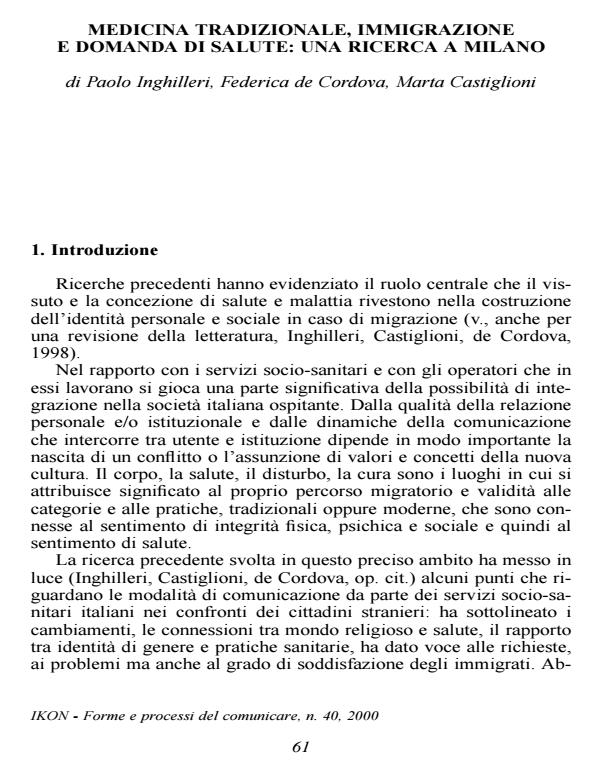Medicina tradizionale, immigrazione e domanda di salute: una ricerca a Milano
Journal title IKON
Author/s Paolo Inghilleri, Federico de Cordova, Marta Castiglioni
Publishing Year 2007 Issue 2000/40
Language Italian Pages 79 P. File size 185 KB
DOI
DOI is like a bar code for intellectual property: to have more infomation
click here
Below, you can see the article first page
If you want to buy this article in PDF format, you can do it, following the instructions to buy download credits

FrancoAngeli is member of Publishers International Linking Association, Inc (PILA), a not-for-profit association which run the CrossRef service enabling links to and from online scholarly content.
Recent data highlight that specific traditional healing systems among immigrants exist in Italy. Traditional familiar medicine and even more structured healing systems managed by professional figures are imported from the original country, and widely used also in Italy. The object of this research, developed within Milan’s territory, is to investigate communication between extra EU citizens belonging to the main communities (Chinese, Egyptian, Philipino, Peruvian) and their own traditional sanitary institutions. Our aim consisted of: a) verifying the presence and consistence of these practices; b) highlighting its action on cceptance/rejection mechanisms in foreign citizens towards Italian sanitary system; c) evaluating the possibility of collaborating between the two systems (traditional, western), and particularly about creating new bicultural services. We proceeded through the following phases: 1) definition of traditional practices and their healing mechanisms, through literature review; 2) focus group and in depth interviews with chosen witnesses; 3) in depth interviews with traditional healers; 4) data analysis and conclusions. The descriptive data analysis started with the answers given regarding the focus points at the interviews. Common elements, shared by the four communities, emerged together with distinguishing marks. Adoption of traditional healing systems is common to all the communities. The use of popular, familiar medicine managed by the elders is widespread. We can say the same for traditional healers with some differences among the communities. Especially in the case of Peruvian community, the figure of shaman seems to be lost, probably because of deep cultural change in the country of origin. All the immigrants use traditional and western medicine alternatively. The choice is pragmatic, based on benefit evaluation and perception. The use of western medicine is instrumental, without deeply effecting the theoretical corpus of the belonging culture. In some cases the traditional treatment has the role of "memory’s object"; in others both traditional and western healers intervene, highlighting one’s passive position relying upon the powerful external intervention. In general, there is integration between the two healing systems. But, while, according to some groups (Chinese), integration means complementary, in other communities (Egyptian) traditional and western medicine are different systems working on different levels and contexts. In any case, their proposal is an easier access to all the treatments in one place, in order to adequate the sanitary service as to the new user’s needs. Immigrants seem to suggest a process where the alternation of different cultural and healing systems, together with respect of individual choice and experience, can open the way to a real form of biculturalism.
Paolo Inghilleri, Federico de Cordova, Marta Castiglioni, Medicina tradizionale, immigrazione e domanda di salute: una ricerca a Milano in "IKON" 40/2000, pp , DOI: